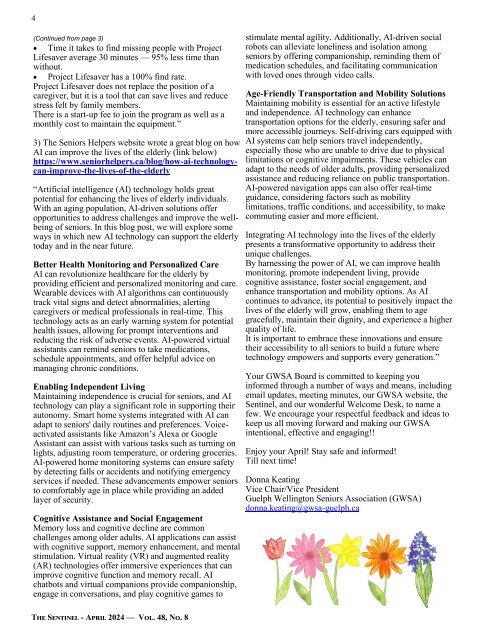April 2024 issue online
Create successful ePaper yourself
Turn your PDF publications into a flip-book with our unique Google optimized e-Paper software.
4<br />
(Continued from page 3)<br />
• Time it takes to find missing people with Project<br />
Lifesaver average 30 minutes — 95% less time than<br />
without.<br />
• Project Lifesaver has a 100% find rate.<br />
Project Lifesaver does not replace the position of a<br />
caregiver, but it is a tool that can save lives and reduce<br />
stress felt by family members.<br />
There is a start-up fee to join the program as well as a<br />
monthly cost to maintain the equipment.”<br />
3) The Seniors Helpers website wrote a great blog on how<br />
AI can improve the lives of the elderly (link below)<br />
https://www.seniorhelpers.ca/blog/how-ai-technologycan-improve-the-lives-of-the-elderly<br />
“Artificial intelligence (AI) technology holds great<br />
potential for enhancing the lives of elderly individuals.<br />
With an aging population, AI-driven solutions offer<br />
opportunities to address challenges and improve the wellbeing<br />
of seniors. In this blog post, we will explore some<br />
ways in which new AI technology can support the elderly<br />
today and in the near future.<br />
Better Health Monitoring and Personalized Care<br />
AI can revolutionize healthcare for the elderly by<br />
providing efficient and personalized monitoring and care.<br />
Wearable devices with AI algorithms can continuously<br />
track vital signs and detect abnormalities, alerting<br />
caregivers or medical professionals in real-time. This<br />
technology acts as an early warning system for potential<br />
health <strong>issue</strong>s, allowing for prompt interventions and<br />
reducing the risk of adverse events. AI-powered virtual<br />
assistants can remind seniors to take medications,<br />
schedule appointments, and offer helpful advice on<br />
managing chronic conditions.<br />
Enabling Independent Living<br />
Maintaining independence is crucial for seniors, and AI<br />
technology can play a significant role in supporting their<br />
autonomy. Smart home systems integrated with AI can<br />
adapt to seniors' daily routines and preferences. Voiceactivated<br />
assistants like Amazon’s Alexa or Google<br />
Assistant can assist with various tasks such as turning on<br />
lights, adjusting room temperature, or ordering groceries.<br />
AI-powered home monitoring systems can ensure safety<br />
by detecting falls or accidents and notifying emergency<br />
services if needed. These advancements empower seniors<br />
to comfortably age in place while providing an added<br />
layer of security.<br />
Cognitive Assistance and Social Engagement<br />
Memory loss and cognitive decline are common<br />
challenges among older adults. AI applications can assist<br />
with cognitive support, memory enhancement, and mental<br />
stimulation. Virtual reality (VR) and augmented reality<br />
(AR) technologies offer immersive experiences that can<br />
improve cognitive function and memory recall. AI<br />
chatbots and virtual companions provide companionship,<br />
engage in conversations, and play cognitive games to<br />
stimulate mental agility. Additionally, AI-driven social<br />
robots can alleviate loneliness and isolation among<br />
seniors by offering companionship, reminding them of<br />
medication schedules, and facilitating communication<br />
with loved ones through video calls.<br />
Age-Friendly Transportation and Mobility Solutions<br />
Maintaining mobility is essential for an active lifestyle<br />
and independence. AI technology can enhance<br />
transportation options for the elderly, ensuring safer and<br />
more accessible journeys. Self-driving cars equipped with<br />
AI systems can help seniors travel independently,<br />
especially those who are unable to drive due to physical<br />
limitations or cognitive impairments. These vehicles can<br />
adapt to the needs of older adults, providing personalized<br />
assistance and reducing reliance on public transportation.<br />
AI-powered navigation apps can also offer real-time<br />
guidance, considering factors such as mobility<br />
limitations, traffic conditions, and accessibility, to make<br />
commuting easier and more efficient.<br />
Integrating AI technology into the lives of the elderly<br />
presents a transformative opportunity to address their<br />
unique challenges.<br />
By harnessing the power of AI, we can improve health<br />
monitoring, promote independent living, provide<br />
cognitive assistance, foster social engagement, and<br />
enhance transportation and mobility options. As AI<br />
continues to advance, its potential to positively impact the<br />
lives of the elderly will grow, enabling them to age<br />
gracefully, maintain their dignity, and experience a higher<br />
quality of life.<br />
It is important to embrace these innovations and ensure<br />
their accessibility to all seniors to build a future where<br />
technology empowers and supports every generation.”<br />
Your GWSA Board is committed to keeping you<br />
informed through a number of ways and means, including<br />
email updates, meeting minutes, our GWSA website, the<br />
Sentinel, and our wonderful Welcome Desk, to name a<br />
few. We encourage your respectful feedback and ideas to<br />
keep us all moving forward and making our GWSA<br />
intentional, effective and engaging!!<br />
Enjoy your <strong>April</strong>! Stay safe and informed!<br />
Till next time!<br />
Donna Keating<br />
Vice Chair/Vice President<br />
Guelph Wellington Seniors Association (GWSA)<br />
donna.keating@gwsa-guelph.ca<br />
The Sentinel - <strong>April</strong> <strong>2024</strong> — Vol. 48, No. 8
















